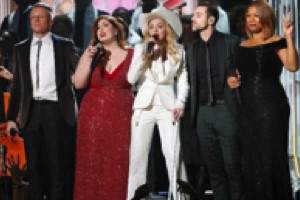
Pivotal moments in our country’s history are oftentimes represented by the music that comes out of those monumental events. While responsive and reflective songs have their own great place in American arts, it is the music compositions that shape our culture rather than become shaped by our culture that become some of the most influential works of their time. Rap music is one of the staple genres for shaping American culture by giving voice to political movements, creating protest and advancing social justice issues that are frequently overlooked for the sake of being politically correct. This unapologetic honesty coupled with a call for change is prominent in Macklemore & Ryan Lewis’ song “Same Love” which calls for recognition and respect for the rights of the LGBTQ community. Through his music Macklemore not only challenges social prejudices but defies the stereotype of the rap musician, creating a greater awareness for the evolving social realities of America today.
Macklemore: Not Your Average Rap Musician
When describing an emblematic rap musician, the idea that comes to mind for most Americans is a pre-conceived image of an African American male who broke out of a lower income community. This stereotype most likely blossomed from the many politically active rap artists like N.W.A. and Public Enemy who made major statements about the modern-age Civil Rights movement and police brutality against persons of color. Rap music is a highly influential political tool that has led to great progress for African American rights. However, music is a universal art that can reach audiences of any demographic and can spark change regarding a wide variety of social injustices. Macklemore, whose birth name is Ben Haggerty, was born to a primarily Irish middle-upper-class family in Seattle, Washington. Because his cultural background does not fit the stereotypical idea of a Rap artist, Macklemore challenges society’s politically incorrect perceptions of the Rap artist. Macklemore, as one of the first popular artists to not fit the traditional mold of the Rap musician, is just the spark in the movement to push social boundaries in the music industry. The Rap genre blossomed out of the need to voice alternative views on current social issues, and as the social issues of American society evolve so will the of the expectations of the characteristic Rap artist.
Entering The Music Scene
Macklemore emerged on the public music scene with his breakout song “Thrift Shop” on August 27th, 2012. Although the song was widely regarded as a typical pop hit a closer look at the lyrics reveals strong political messages on poverty, gluttony, and greed. One line of the hit song reads:
“They be like, Oh, that Gucci. That’s hella tight
I’m like, Yo that’s fifty dollars for a T-shirt
Limited edition, let’s do some simple addition
Fifty dollars for a T-shirt, that’s just some ignorant bitch”
While this line is buried within light-hearted lines about finding outlandish clothes at a thrift shop, Macklemore brings up the perplexity of American consumerism and the unreasonable social status symbol created by high fashion brands. Unbeknownst to the American public this was just the beginning of Macklemore’s use of subliminal political messages that would bring American Rap music back to its roots as protest art.
“Same Love”: Creating Awareness for LGBTQ Rights
“Same Love”, recorded by Macklemore & Ryan Lewis in collaboration with Mary Lambert in February 2012, immediately became an anthem for the struggles of the LGBTQ community. Macklemore’s motivation to write this piece come from watching his Uncle and his partner struggle for equality in a closed-minded world. The song focuses on falsifying the perception that being gay is a choice or a fad while focusing on the commonalities that humans of any sexual identity share, mainly the desire to just be loved. The lyrics of the song read:
When I was in the 3rd grade
I thought that I was gay
Cause I could draw, my uncle was
And I kept my room straight
I told my mom, tears rushing down my face
She’s like, “Ben, you’ve loved girls since before Pre-K!”
Tripping, yeah, I guess she had a point, didn’t she?
A bunch of stereotypes all in my head
I remember doing the math, like
“Yeah, I’m good at little league”
A pre-conceived idea of what it all meant
For those that like the same sex had the characteristics
The right-wing conservatives think it’s a decision
And you can be cured with some treatment and religion
Man-made, rewiring of a pre-disposition, playing God
Ahh, nah, here we go
America the brave still fears what we don’t know
And “God loves all his children” is somehow forgotten
But we paraphrase a book written thirty-five hundred years ago
I don’t know
Chorus: And I can’t change
Even if I tried
Even if I wanted to
And I can’t change
Even if I tried
Even if I wanted to
My love, my love, my love
She keeps me warm
She keeps me warm
She keeps me warm
She keeps me warm
If I was gay I would think hip-hop hates me
Have you read the YouTube comments lately?
“Man, that’s gay” gets dropped on the daily
We’ve become so numb to what we’re saying
Our culture founded from oppression
Yet we don’t have acceptance for ’em
Call each other faggots
Behind the keys of a message board
A word rooted in hate
Yet our genre still ignores it
“Gay” is synonymous with the lesser
It’s the same hate that’s caused wars from religion
Gender to skin color, the complexion of your pigment
The same fight that led people to walk-outs and sit-ins
It’s human rights for everybody, there is no difference
Live on! And be yourself!
When I was in church they taught me something else
If you preach hate at the service, those words aren’t anointed
That Holy Water that you soak in has been poisoned
When everyone else is more comfortable remaining voiceless
Rather than fighting for humans that have had their rights stolen
I might not be the same but that’s not important
No freedom til we’re equal
Damn right I support it
I don’t know
Chorus
We press play, don’t press pause
Progress, march on!
With a veil over our eyes, we turn our back on the cause
‘Til the day that my uncles can be united by law
Kids are walking around the hallway
Plagued by pain in their heart
A world so hateful
Some would rather die
Than be who they are
And a certificate on paper
Isn’t gonna solve it all
But it’s a damn good place to start
No law’s gonna change us
We have to change us
Whatever god you believe in
We come from the same one
Strip away the fear, underneath, it’s all the same love
About time that we raised up!
Chorus
Love is patient, love is kind
Love is patient (not crying on Sundays)
Love is kind (not crying on Sundays)
Love is patient (not crying on Sundays)
Love is kind (not crying on Sundays)
Love is patient (not crying on Sundays)
Love is kind (not crying on Sundays)
Love is patient (not crying on Sundays)
In “Same Love”, Macklemore exposes many pressing issues that the LGBTQ community is facing while striving for acceptance and equality, such as the use of the word “gay”, conflict with the church and conservative politicians and growing suicide rates for individuals who are trying to define their sexual identity. This song became an anthem for the LGBTQ community in their fight for rights, specifically gay marriage, which is explicitly referenced in the final verse of the song when Macklemore sings “And a certificate on paper / Isn’t gonna solve it all / But it’s a damn good place to start / No law’s gonna change us / We have to change us”. Macklemore’s chooses to not target and blame the government or any other institution but instead calls for change on a small scale by changing the general populace’s mindset on gay marriage. By connecting to the people on an emotional level through universal values such as love and safety Macklemore effectively popularized the mindset of acceptance and understanding towards the LGBTQ community.
Collaboration is Key: Mary Lambert
When Macklemore and Ryan Lewis were searching for a chorus for their piece, Mary Lambert eagerly wrote 3 different versions of the chorus in hopes of becoming part of the project. Lambert provided a unique vantage point on the issue being both Christian and a lesbian. Her life story itself defying the traditional stereotypes of the LGBTQ community Lambert felt it was her duty to express to the world the message of complete love and acceptance. When asked what her motivations were in writing the piece she defines the core purpose of the song being to end homophobia. In an interview with ABC News Lambert says that “If you want to change people’s hearts it’s not through the brain, but through the heart….everybody wants someone to keep them warm”. Lambert’s expressive delivery and sweet, smoky vocal timbre adds a rich emotional quality to the song that straight Rap music may not be able to convey and helps reinforce the message that love is an essential human right, whether it be for a man or a woman.
The 56th Annual Grammy Awards: The Aftermath

The 56th Grammy Awards performance of “Same Love” served as a manifestation of the political messages of the piece as 33 gay and straight couples were married by Queen Latifah on stage during their performance as a celebration of the passing of California legislation giving same sex couples the right to marry. The performance served as a national political statement that normalized the concept of same sex marriage and acting as a springboard for many other states to allow same sex marriage followed by the Supreme Court decision on June 26th, 2015 to motion federal legislation on the matter. Although to political progress made for LGBTQ rights cannot be solely credited to “Same Love”, the wide spread acceptance and popularity of the piece rallied support for the rights of LGBTQ community members especially among the young-adults of modern America.
Bibliography
“Different Love?: Introducing the Trans/Queer Issue” Journal of Popular Music Studies 25.4:411-414
Haggerty, Ben, Ryan Lewis, Mary Lambert, Queen Latifah, and Maddona. “56th Annual Grammy Awards.” 56th Annual Grammy Awards. Los Angles, California, 2014. Youtube. Web. 1 Nov. 2015.
Hiatt, Brian. “393 Million Macklemore (And Ryan Lewis!) Fans Can’t Be Wrong.” Rolling Stone 1190 (2013): 40-70. Music Index. Web. 1 Nov. 2015.
“Macklemore, Queen Latifah Turn ‘Same Love’ Into Mass Grammy Wedding.” Rolling Stone. Rolling Stone, 26 Jan. 2014. Web. 1 Nov. 2015.
“Mary Lambert Interview: ‘Same Love’ Singer Hopes Song Can Help End Homophobia.” Youtube. ABC News, 30 Apr. 2014. Web.
Trust, Gary. “Lambert’s ‘Warm’ Heats Up.” Billboard 126.4 (2014): 61. Music Index. Web. 1 Nov. 2015.
Weber, Shannon. “Daring To Marry: Marriage Equality Activism After Proposition 8 As Challenge To The Assimilationist/Radical Binary In Queer Studies.” Journal of Homosexuality 62.9 (2015): 1147-1173. Academic Search Premier. Web. 8 Nov. 2015.
Laurel Wenckowski